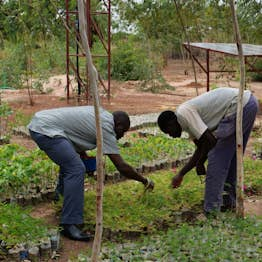Introduction
Development cooperation relations between Burkina Faso and the Grand Duchy date back to 1996, when Burkina Faso became a Luxembourg Development Cooperation partner country.
Read more
In order to reinforce these links, on 27 October 1999 the two countries signed an initial framework cooperation agreement, succeeded by the signing of three Indicative Cooperation Programmes (ICPs), the first in 2003.
In 2022, development cooperation relations were governed by ICP III (2017 – 2022), signed on 21 November 2016 by both governments for an initial period of 5 years. ICP III was extended by one year in 2021, bringing its total duration to 6 years. ICP III formally ended on 31 December 2022. The signing and entry into force of the ICP IV, covering the 2023 – 2027 period, initially scheduled for 7 February 2022, had to be suspended due to the coup d’état on 24 January 2022. Yet the population’s need for support remains enormous. Thus, in close coordination with partners from Europe and Burkina Faso, the Luxembourg Development Cooperation continued its commitment in 2022. Neither the budget for NGO activities nor the budget for multilateral and bilateral programmes was reduced. However, Luxembourg took the decision that a number of activities would be implemented directly by LuxDev rather than through central funds managed by the Government of Burkina Faso.
In view of the outcome of the negotiations between the Burkinabe transitional authorities and the Economic Community of West African States (ECOWAS), in particular as regards the duration of the 24-month transition starting on 1 July 2022, in July 2022 Luxembourg unilaterally adopted a transition strategy covering the years 2023 and 2024 in order to ensure the continuity of Luxembourg’s support for the sustainable development of Burkina Faso, in the absence of an applicable ICP. The transition strategy is based on the vision conveyed by the initial ICP IV and the national development plans of the Burkinabe authorities. For the 2023 – 2024 period, a total financial envelope (bilateral, multilateral, NGOs, humanitarian) of EUR 59 million is planned. For 2025, a financial envelope of EUR 17 million is planned to allow a continuation of bilateral interventions pending the finalisation of a new ICP with the next democratically legitimised Burkinabe government.
At the bilateral level, in 2022 the Luxembourg Development Cooperation continued to implement the bilateral programmes in the ICP III, adapting to the new institutional and security context. At the same time, the Luxembourg Development Cooperation extended, until 2025, two bilateral programmes that had initially expired at the end of 2022. These were the “Programme to support the sustainable management of forest resources” and the “Programme to support the implementation of the education and training sector plan” , with an additional financial envelope of EUR 34 million. Within the framework of the programme in the environmental sector, the sustainable management of forest resources will remain a priority of the programme. In addition, there will be an increased emphasis on improving environmental governance and sustainable development, the transition of Burkina Faso towards a green and inclusive economy, and support for coordination and sectoral environmental leadership. With regard to the programme in the education sector, activities will focus on education in emergency situations, taking into account developments in the security context, the quality of the education sector, increasing the role of environmental education in the school context, as well as governance of the education and training sector.
Finally, in 2022, 13 Luxembourgish NGOs were active in Burkina Faso, and continued to implement their projects through their local partners, despite the political and security crisis.
Following developments in the security and humanitarian situation in Burkina Faso, Luxembourg is continuing to considerably increase its support in the field of humanitarian assistance. In 2022, Luxembourg contributed EUR 7 671 085.85 to emergency and “nexus” projects and programmes. Thus, Luxembourg supported the World Food Programme, the International Committee of the Red Cross, the Office of the United Nations High Commissioner for Refugees, the Office for the Coordination of Humanitarian Affairs and several humanitarian NGOs. In addition, partnerships were actively sought between the programmes implemented bilaterally by the LuxDev agency and humanitarian actors supported by Luxembourg.
Development of PDA
In response to the international food and nutrition crisis, Luxembourg is supporting three interventions in Burkina Faso, with a total financial envelope of EUR 4 million. Two interventions have been implemented by the German NGO Welthungerhilfe, with financial envelopes of EUR 1 million each, with the aim of providing immediate, safe and adequate access to food for the most vulnerable populations while covering the food needs of newly displaced people in the north central and east central regions during the lean season and providing adequate emergency assistance for newly displaced households, by supplying either food or money transfers. The third intervention involves a contribution of EUR 2 million to support the “School feeding Support Project” in the north central region, implemented by the NGO Catholic Relief Services.
Reference data
- Population (MIO): 22,10
- GNI (per resident): 2270
- Human Development Index (HDI): 184/191
- Life expectancy: 59
